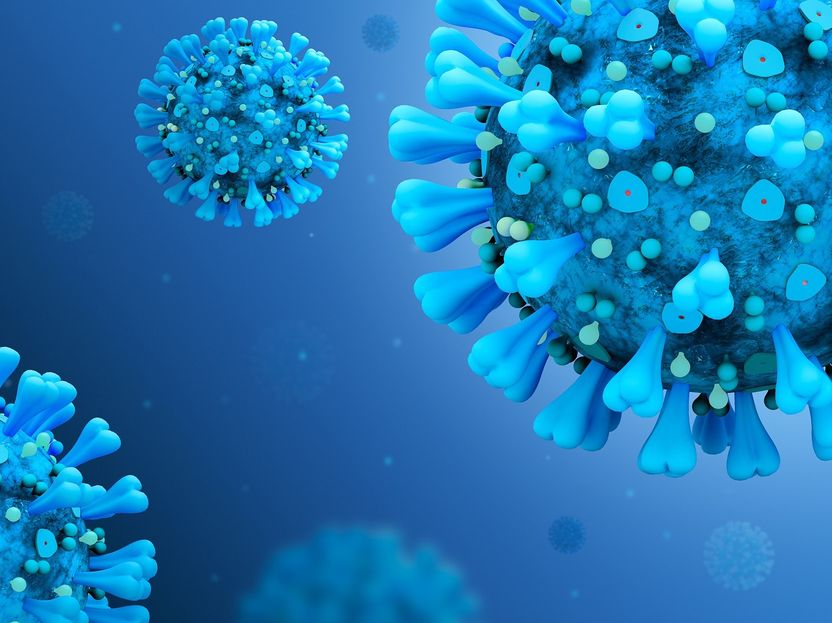Antibodies from COVID-19-Vaccinated Recognise Different SpikeProtein Structures than Antibodies from Convalescents
Advertisement
Some Covid-19 vaccines use a modified (stabilised) variant of the Coronavirus SARS-CoV-2 spike protein as a target antigen structure. In SARS-CoV-2 infections, the immune system recognises the unmodified form of the spike protein as an antigen. Researchers at the Paul-Ehrlich-Institut were able to observe that antibodies formed post-vaccination recognise different spike protein linear structures than antibodies formed post-infection. The comparison was made with antibodies in the serum of individuals vaccinated with Comirnaty (BioNTech/Pfizer) and antibodies in serum from COVID-19 convalescents. A report on the findings appears in the online edition of Vaccines from 1 December 2021.

Symbolic image
pixabay.com
In the effort to combat the Coronavirus pandemic, multiple COVID-19 vaccines were developed based on an immune response to the SARS-CoV-2 spike protein (s protein). The shape of the spike protein, known as its conformation, changes upon contact with the ACE2 cell receptor. The spike protein takes on the pre-fusion conformation. This sets up the next step in the cellular infection process, which is the fusion of virus and cell membranes. Some COVID-19 vaccines, the Comirnaty vaccine from BioNTech/Pfizer for example, are based on this pre-fusion conformation of the spike protein. The pre-fusion conformation is produced by introducing two mutations into the structural design of the spike protein. It is then kept stable in this conformation as a stabilised pre-fusion spike protein. The pre-fusion spike protein serves as an antigen in COVID-19 vaccines to reduce the theoretical risk of generating infection-enhancing antibodies.
The immune system produces antibodies against external and externally accessible protein structures. These structures are known as epitopes, which can vary between the natural form of the spike protein and its stabilized pre-fusion conformation. Accordingly, the following hypothesis was tested: The antibodies formed against the natural form of the spike protein in COVID-19 infections recognise different epitopes than the antibodies formed after vaccination with the pre-fusion form of the spike protein. Antibodies against linear epitopes consisting of sequential protein building blocks (amino acids) were studied. Antibodies against spike protein spatial structures, which consist of multiple, non-sequential amino acids, were not studied.
The research team, led by Professor Eberhard Hildt, head of the Virology Division at the Paul-Ehrlich-Institut, performed a comparative epitope mapping together with scientists at the Aachen University Hospital and the Main-Kinzig Clinics. They identified 36 linear epitopes, which were recognised by antibodies in sera from COVID-19 vaccinated individuals. Twenty-seven of these epitopes were recognised almost exclusively by antibodies in sera from convalescents. The mapping of these epitopes to the spike protein structures revealed that most of these 27 epitopes are masked in the pre-fusion conformation. This means that they are hidden and therefore not exposed to antibodies. In particular, the researchers identified three epitopes in a conserved, central portion (central helix), which are only exposed in the post-fusion conformation of the spike protein. This is the conformation present after the fusion of virus and cell membranes.
The study’s conclusion pointed out the greater variety in spike-specific antibodies in convalescents in comparison to Comirnaty-vaccinated individuals. Whether this has a clinically relevant impact on the breadth of spike-specific immune response, however, cannot yet be answered with the data currently available.
Original publication
Other news from the department science
Most read news
More news from our other portals
See the theme worlds for related content
Topic world Antibodies
Antibodies are specialized molecules of our immune system that can specifically recognize and neutralize pathogens or foreign substances. Antibody research in biotech and pharma has recognized this natural defense potential and is working intensively to make it therapeutically useful. From monoclonal antibodies used against cancer or autoimmune diseases to antibody-drug conjugates that specifically transport drugs to disease cells - the possibilities are enormous

Topic world Antibodies
Antibodies are specialized molecules of our immune system that can specifically recognize and neutralize pathogens or foreign substances. Antibody research in biotech and pharma has recognized this natural defense potential and is working intensively to make it therapeutically useful. From monoclonal antibodies used against cancer or autoimmune diseases to antibody-drug conjugates that specifically transport drugs to disease cells - the possibilities are enormous






















































